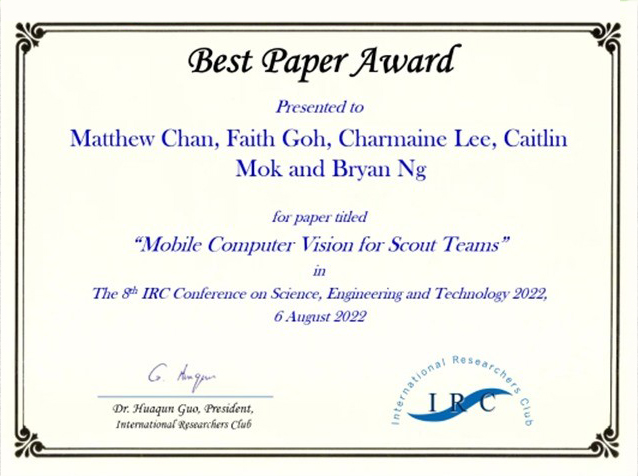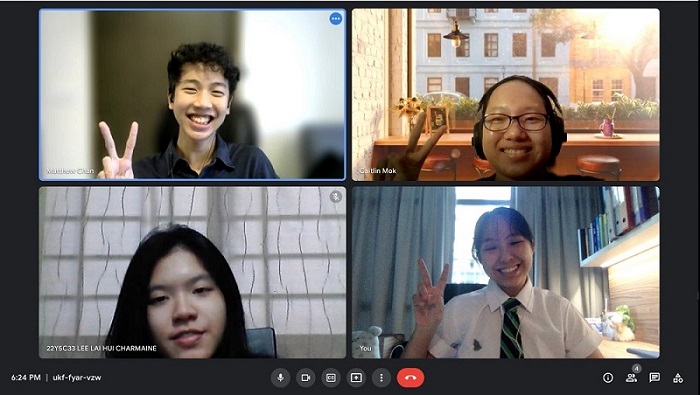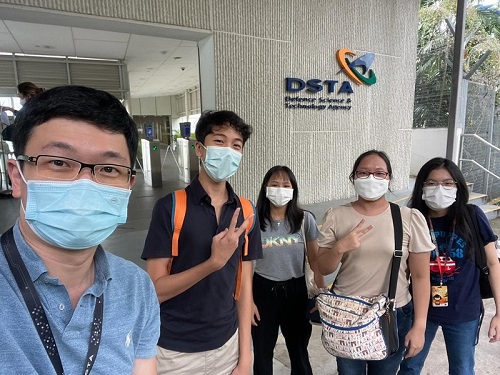15 Aug 2022
For a group of Young Defence Scientists Programme (YDSP) participants, windows are not just features on a building, but rather windows of opportunity to explore defence science and tech – quite literally!
With urban warfare becoming more prevalent today, it is key to be able to detect threats hiding within buildings efficiently. The group zoomed in on technological advancements in computer vision, and developed a mobile app capable of monitoring a large number of windows at once.
Their research entitled ‘Mobile Computer Vision for Scout Teams’ clinched them the Best Paper Award at the International Researchers Club’s 8th Conference on Science Engineering and Technology (IRC-SET) held on 6 August 2022. Organised by the International Researchers Club, which has over 30 experts from six countries, the IRC-SET is an annual platform for young Singaporeans to showcase their innovations. Submitted papers undergo rigorous panel reviews, with shortlisted papers published to encourage the exchange of ideas.


The group consisted of students Matthew Chan, Faith Goh, Charmaine Lee and Caitlin Mok. They had written the paper earlier as part of the student programme Research@YDSP under the mentorship of DSTA’s Head Capability Development (Unmanned Ground Vehicles) Bryan Ng.
As part of Research@YDSP, the students were able to gain hands-on experience in domains usually not available to them in school. In particular, they dabbled with computer vision, and their newfound knowledge allowed them to develop the mobile app.
The opportunity to engage in experiential learning was exactly what Charmaine from Dunman High School had signed up for. She explained: “Research@YDSP gave me the chance to do hands-on learning and dive deeper into my interests in computer vision and machine learning.”
Raffles Institution student Faith, who was also a fan of research and experimentation methodologies, agreed whole-heartedly: “It was a programme highly recommended by my teachers. DSTA is indispensable to building a robust defence system for Singapore, and I wanted to be able to experience and contribute to defence technology too via YDSP!”
Developing the mobile app was not without its challenges. However, the students faced them head on with gusto and relished their YDSP experiences.
“YDSP was the perfect opportunity for me to explore a field I’m passionate in, while giving me a taste of what it would be like to work in a professional environment. Our mentor Bryan was extremely supportive throughout our journey – he was always there to guide us along despite his busy schedule,” Matthew from St. Joseph Institution chimed in.

The students with Bryan (first from left).
For Bryan, he believed that there was much more to his role than helping his mentees win awards.
“Being their mentor allowed me to share my experiences with the next generation of engineers and pay it forward to the engineering community. I always aim to cultivate my mentees’ understanding of how various engineering disciplines can come together to achieve more than the sum of their parts. Teamwork and curiosity are key traits for any engineer,” he said.
This belief has definitely paid off. Faith recounted: “Bryan even showed us how our research could be implemented in one of DSTA’s latest projects. That made us realise we were actually playing a role in real-life defence developments.”
Charmaine added: “This experience opened my eyes to the various defence technologies out there, and it has really sparked my interest!”
